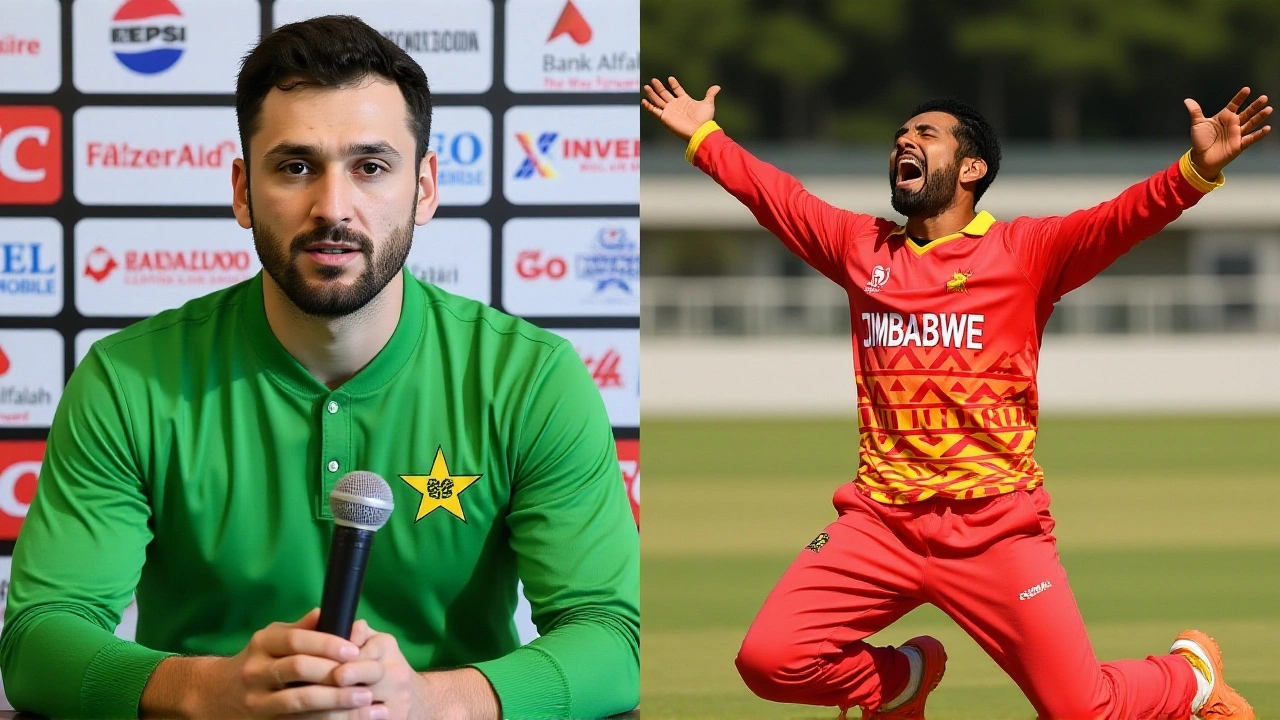Pakistan Qualify for Tri-Nation Final After 69-Run Win Over Zimbabwe in Islamabad

Pakistan punched their ticket to the Tri-Nation Series 2025 final with a commanding 69-run victory over Zimbabwe in the fourth T20I at the Islamabad Capital Territory cricket stadium on Monday, November 24, 2025. The win wasn’t just about securing a spot in the final—it was a statement. Pakistan posted 195 for 5, then ripped through Zimbabwe’s batting order in a performance that left the visitors reeling. At the heart of it all: Babar Azam, calm under pressure, and Usman Khan, whose career-best 4 for 18—complete with a hat-trick—turned the game on its head.
Powerhouse Batting Sets the Stage
Pakistan didn’t start explosively, but they didn’t need to. Babar Azam, 27, walked in at 47 for 2 and anchored the innings with a composed 74 off 52 balls—seven fours and four sixes. His partnership of 63 with Farhan (41 off 38) steadied the ship after early wobbles. What made it special was the finish. With the score at 126 for 4 in the 16th over, the game looked manageable. Then came the surge. Bakar Zaman (27 off 10) exploded in the final five overs, smashing sixes and boundaries with fearless intent. Pakistan added 69 runs in those last five overs, capped by 25 in the final over—a sequence that turned a solid total into a daunting one."It wasn’t about hitting sixes from ball one," said a senior Pakistan selector post-match. "It was about letting the innings breathe, then exploding when the field spread. That’s what Babar does. He turns pressure into opportunity."
Usman Khan’s Masterclass
If Pakistan’s batting was the foundation, Usman Khan’s spell was the wrecking ball. His 4 for 18 in just four overs wasn’t just economical—it was devastating. He removed Zimbabwe’s top three in a single over: Brendan Taylor (39), Sikandar Raza, and then a young opener caught at deep midwicket. The hat-trick came on the final three balls of his third over, a feat not seen in international T20Is since 2022. The crowd at Islamabad roared. Players on the field exchanged stunned glances. Even the commentators, usually measured, were speechless for a full ten seconds."I just tried to bowl my line," Khan said afterward, wiping sweat from his brow. "I knew if I kept it tight, they’d come after me. And they did. That’s when you take your chance."
Support came from Muhammad Nawaz (2 for 21), who pinned the middle order with his subtle variations, and Fahim, Vasim Junior, and Nasim Sha, who chipped in with crucial wickets. Zimbabwe, chasing 196, collapsed from 6 for 1 to 4 for 59. Only Burl offered resistance with a gritty 43 off 34, but by then, the damage was done.

Zimbabwe’s Batting Collapse
For Zimbabwe, it was another case of promising start, brutal finish. Veteran Brendan Taylor, playing his 119th T20I, looked composed early but couldn’t convert. He was bowled by Khan’s leg-cutter—his 39th birthday present turned sour. The top three—Taylor, Raza, and opener Bennett—combined for just 17 runs. The middle order, expected to rebuild, folded under pressure. By the 13th over, Zimbabwe were 72 for 6. The scoreboard read 126 all out. The gap? 69 runs. A margin that tells you everything."We had the tools," said Zimbabwe captain Sikandar Raza post-match. "But when the ball starts swinging and the bowlers are hitting the right areas, you can’t just hope. You have to execute. We didn’t. That’s on us."
What This Means for Pakistan
This win wasn’t just about qualifying. It was about momentum. Pakistan, who lost their opening match of the series, have now won three straight. Babar Azam is in sublime form. Usman Khan has announced himself on the global stage. The middle order, long a concern, showed grit and power. And the bowling attack? Balanced, lethal, and confident.They now await their opponent in the final—either Afghanistan or the third team in the series, whose result will be confirmed in the final group-stage match. The final is expected to be held in Lahore or Karachi within the next 72 hours, according to sources close to the Pakistan Cricket Board. No official announcement has been made yet, but PCB officials have confirmed the final will be broadcast on Dot Republic Media’s Sports TV and Sports Central channels.

Historical Context and Broader Implications
This is Pakistan’s first final in a tri-nation T20I series since 2021. Back then, they lost to Sri Lanka in a rain-affected final. This time, they’re not just playing for pride—they’re playing for confidence ahead of the 2026 T20 World Cup qualifiers. Zimbabwe, meanwhile, remain winless in the tournament, extending their streak of T20I losses against full-member nations to 14 straight since 2023. Their development pathway is under increasing scrutiny from the International Cricket Council."This series exposed the gap," said former Zimbabwe all-rounder Heath Streak in a post-match analysis. "Pakistan didn’t just outplay them. They out-thought them. Zimbabwe’s young batters need to learn how to handle pressure. Right now, they’re just reacting."
Frequently Asked Questions
How did Usman Khan’s hat-trick impact the match outcome?
Usman Khan’s hat-trick in the 12th over dismantled Zimbabwe’s top order, turning what was a competitive 6 for 1 into a crumbling 4 for 59. His 4 for 18 included the wickets of Brendan Taylor, Sikandar Raza, and the opener—all in consecutive deliveries. This not only broke Zimbabwe’s momentum but also shattered their confidence, forcing the middle order into panic mode. It’s the first hat-trick by a Pakistani bowler in T20Is since 2022 and the first in a tri-nation series since 2019.
Why did Zimbabwe’s top order fail despite having experienced players like Brendan Taylor?
Taylor, 39, was outplayed by a combination of tight line-and-length bowling and aggressive field placements. Pakistan’s captain Babar Azam set a trap: short midwicket and deep backward square leg, inviting the pull shot. Taylor, used to facing slower pitches, mistimed his first two balls. The next, a leg-cutter, found the edge. His experience didn’t help because Pakistan’s bowlers didn’t give him room. The other top-order batters, younger and less tested, followed suit under pressure.
What’s the significance of Pakistan’s 69-run win in the final overs?
The 69 runs in the final five overs—25 in the last over alone—showed Pakistan’s depth and nerve. Bakar Zaman’s 27 off 10 balls wasn’t just power-hitting; it was calculated aggression. It turned a 160-170 total into a 195 target, making Zimbabwe’s chase nearly impossible. Historically, teams chasing over 190 in T20Is win only 18% of the time on Pakistani pitches. This score, combined with the bowling, made it a near-certain win.
Who are Pakistan’s likely opponents in the final?
Pakistan will face either Afghanistan or the third team in the series, depending on the outcome of their final group match. Afghanistan, currently second in the table, are the favorites to qualify. They’ve won two of their three matches and boast a stronger bowling attack than Zimbabwe. A final between Pakistan and Afghanistan would be a high-stakes clash—both teams are preparing for the 2026 World Cup qualifiers, and this final could be a psychological battleground.
What role did the Pakistan Cricket Board play in organizing this series?
The Pakistan Cricket Board organized the entire Tri-Nation Series 2025, selecting venues, scheduling matches, and coordinating with international boards. They also secured broadcast rights through Dot Republic Media, ensuring wide reach. The PCB’s decision to host all matches in Pakistan—especially the final—was strategic, aiming to rebuild fan engagement after years of limited home series. This win could boost ticket sales and TV ratings ahead of the World Cup qualifiers.
How does this result affect Zimbabwe’s cricket future?
Zimbabwe’s loss deepens concerns about their development pipeline. Despite having veteran players like Taylor, their younger batters continue to struggle against quality pace and spin. The ICC has already signaled it may review Zimbabwe’s Test status if their T20I performances don’t improve. This series has been a wake-up call: they need structured coaching, more exposure to high-pressure games, and better financial support. Without these, their international relevance will keep fading.